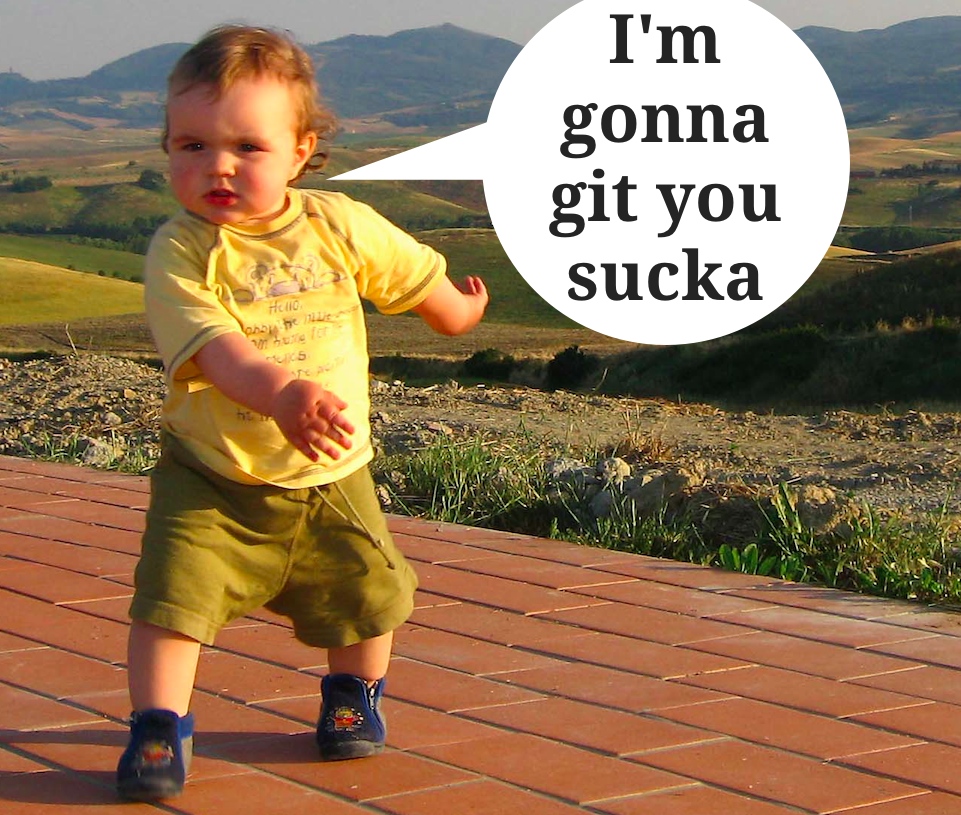Adaptive Timeboxing
Hurdle: Getting Started
A project can seem supremely overwhelming before you start it. But, once it's started, your resistance to it often lessens dramatically in power.
Before you start the project, it looks like this:

After you start the project, it looks like this:

The secret is that the vicious hound was actually the little puppy the whole time!
So why did it look so scary?
Resistance
Well, there's a force in the universe called Resistance. It's a force like gravity, but it's sole purpose is to keep you from progressing as a human. It has nothing to do with God or the Devil or anything with a soul. It doesn't hate you. It's like gravity - it's just there and it's impersonal. It works to thwart any act of initiative that will help you grow.
- New exercise program? Resistance
- New code project? Resistance
- New art piece? Resistance
So, how do you overcome Resistance?
You only have limited willpower, so using brute force will deplete you quickly and set you up for failure.
Willpower and Chinese Finger Traps
It's much better to use techniques that require little willpower so that you can use them to overcome Resistance regularly and still have the energy left for your actual project.
Resistance is kind of like a Chinese finger trap.

If you pull really hard, the trap just traps you harder. If you are gentle and use small slow movements, you can escape easily.
For example, if you tell yourself you're going to work all day and all night with no breaks and no fun in order to finish a project, then you can expect massive resistance and may end up on Hacker News/Facebook/Reddit/Pinterest/etc all day instead of doing any meaningful work.
However, if you tell yourself you will work for only 5 minutes and then take a break, then there's very little surface area for Resistance to get traction on.
Adaptive Timeboxing Kung-Fu

Rather than tackle Resistance head-on, you incrementally reduce the scope of your first session until the Resistance to get started has little power.
For example:
Say, "I'll start with an hour session" to yourself, then see how much you pout and want to avoid starting. If you experience a lot of Resistance, then just reduce it further. Keep doing this until you feel that the Resistance is reasonably low and that it's not that big of a deal to start.
- 60 min session? Crying :(
- 30 min session? Ugh, please no
- 10 min session? Poo-hoo, I still don't want to
- 5 min session? Well, it's only 5 min, I guess I could do that...
The times I mention in this example are arbitrary. Also, these times will likely be different every time you perform this exercise.
When I am feeling extra motivated, I can start with a 3 hour session and feel perfectly happy about it. However, when I'm feeling massive Resistance I may have to go all the way down to a 2 minute session in order to get myself going.
Once you're over that first hurdle of getting started, Resistance is often greatly diminished.
If I'm feeling massive Resistance, then I might start with a 2 minute session, then a 2 minute break, then another 2 minute session, and keep going like that for awhile. But the further I get into the project, the more Resistance weakens and soon I might be doing 30 minute sessions.
You can also adaptively set your break times. If 2 minutes of work and 10 minutes of play is the ratio it takes for you to happily start, then great! The exact times don't really matter that much - just that you have a technique to reliably get you started. Getting started is the hardest part. After that, you have the upper hand against Resistance.

Related: Productivity Tip: Let It Cool
Notes:
- Is this like the Pomodoro technique? Yep! It was derived from it. I started with the Pomodoro technique, but its standard 25 minutes was often just too long when I was trying to overcome the resistance to getting started.
- Where can I learn more about Resistance and overcoming it? The idea of Resistance is not mine - it comes straight from The War of Art by Steven Pressfield. He dives into what Resistance is and how to defeat it much better than my tiny contribution here.
- Is this like Tiny Habits? I actually was just introduced to Tiny Habits after I wrote this post. It looks very similar and very powerful (and certainly backed by more research than my approach!).
Credits:
The term 'Adaptive Timeboxing' was recommended by Arialdo Martini in our twitter conversation on this a few months ago.
- Hound by smerikal
- Puppy by Bill Selak
- Finger Trap by Michelle Tribe
- Kung-Fu Baby by hans thijs (speech bubble added)
- Excelsior by tempophage (speech bubble added)
Original: 15 Apr 2014